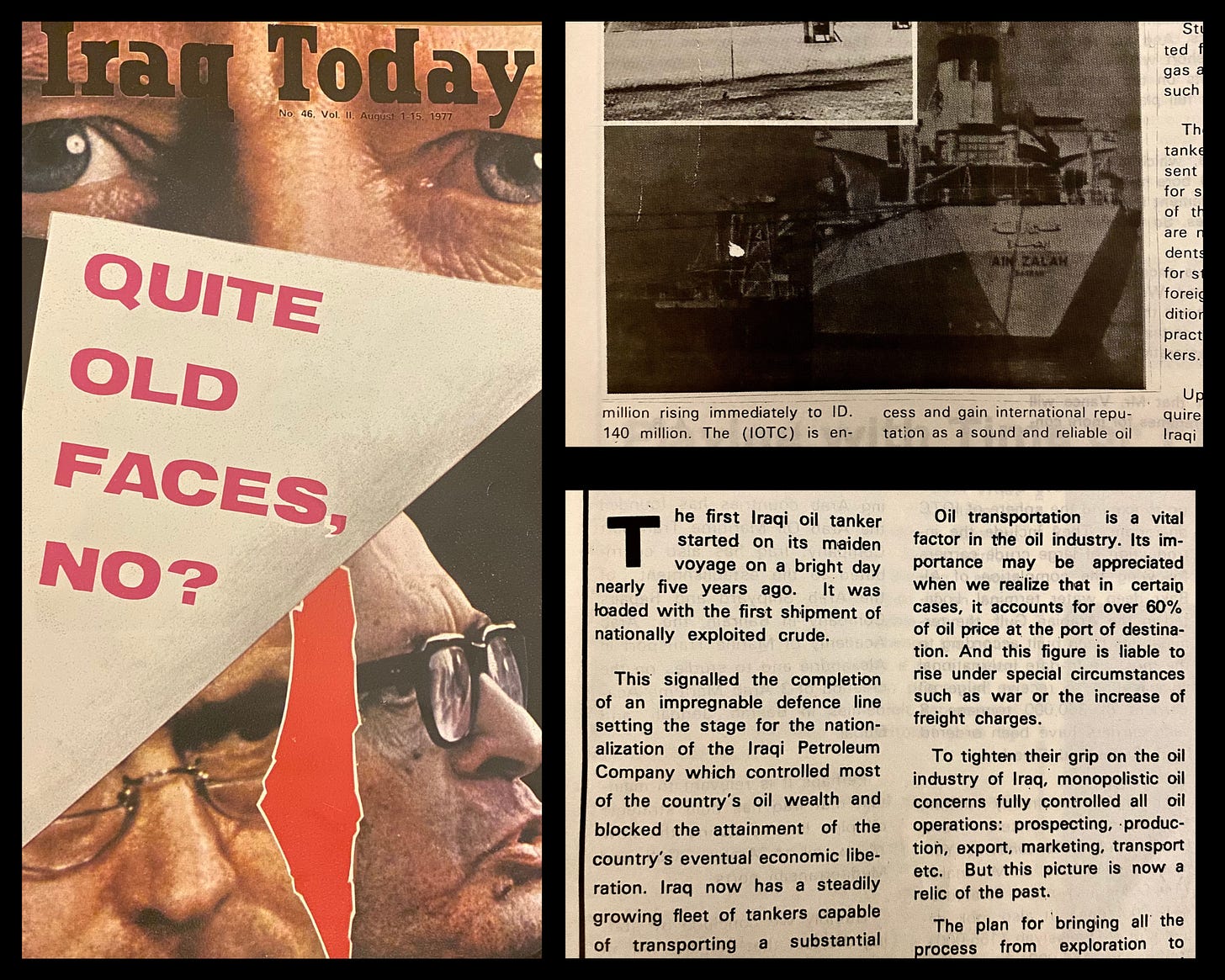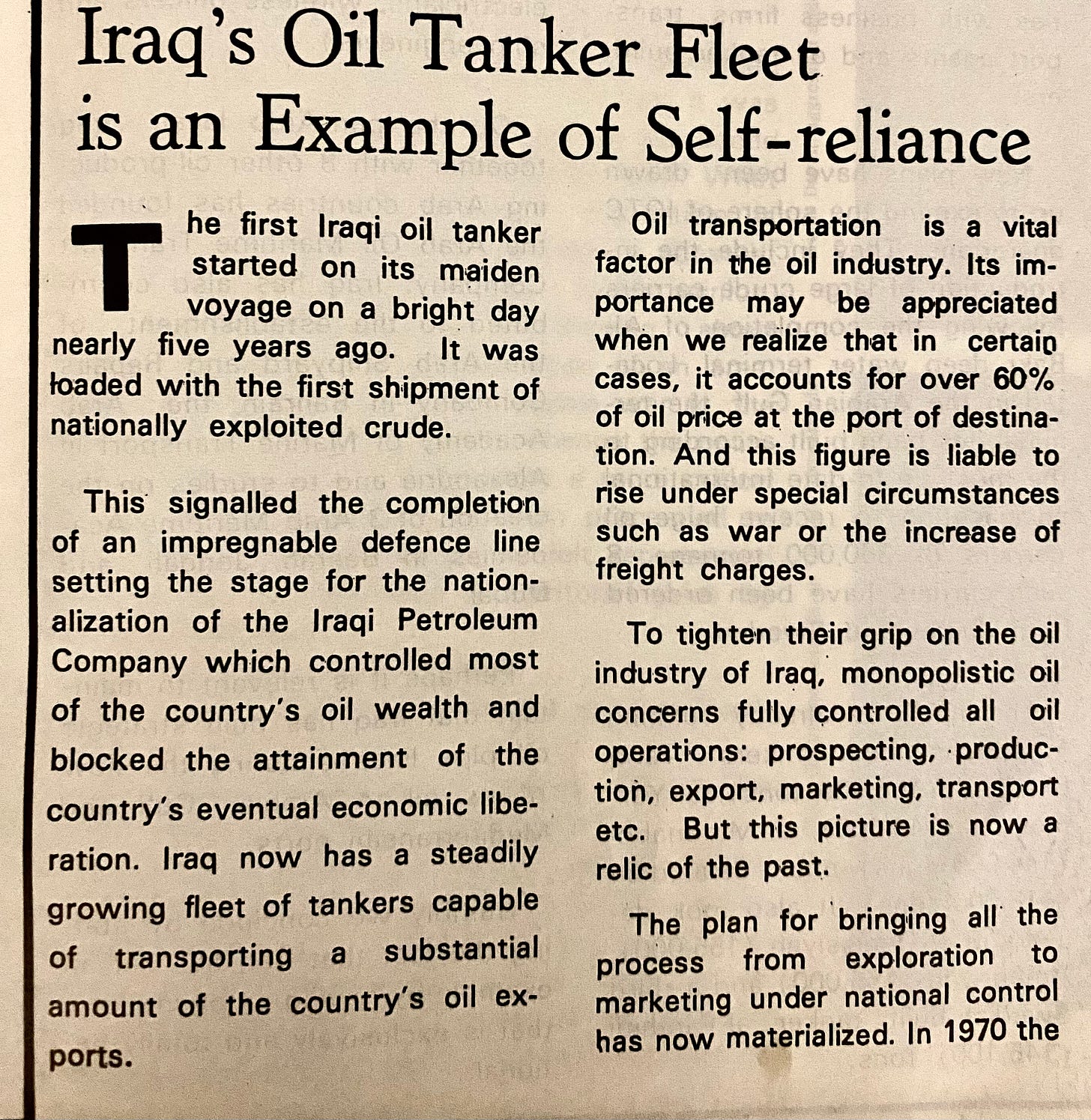Hello there, Noam here.
Most of the historical documents I have been publishing can hardly be found nowadays, and for this reason I decided to start sharing audio versions of the articles to remember a history that is sometimes forgotten, buried, or muted. I encourage you to listen to the pieces if you don’t always have time to read, or if you prefer audio articles.
Today’s article is about Iraq’s oil tanker fleet following the nationalization of the Iraq Petroleum Company (IPC) in 1972. The full piece can be found in the audio above, and below is a summary with some information about Iraq’s current fleet. I share the work the way it was published— with no modifications. As for those who would like to know more about the politicization of Iraq’s oil, I recommend one of many books that discuss Iraq’s oil policies during that period at the end of the post. Thank you for reading my work.
The article Iraq’s Oil Tanker Fleet is an Example of Self-reliance was published in August 1977 in the Iraq Today magazine, which was issued by the ministry of information in Baghdad. The piece reveals details about Iraq’s oil tankers during that period, as well as the establishment of the Iraqi Oil Tankers Company (IOTC) that still exists until today.
Al-Rumaila, the first Iraqi oil tanker carrying the first shipment of “nationally exploited” crude oil, sailed from the Gulf region on April 9, 1972, “inaugurating a new era in Iraqi oil history,” wrote Iraq Today. In addition to Al Rumaila, Iraq acquired 6 other tankers between 1972 and 1973 and they were all named after Iraqi oilfields, such as Khanaqin, Janbour, Gurgur, and Bazirgan.
According to the magazine, as part of its efforts to bring oil exploration and marketing under its control, the Iraqi government— that was led back then by the Arab Baath Socialist Party— ordered the seven oil vessels from Spain to create “the nucleus of an Iraqi fleet of tankers.”1
After Al Rumalia’s maiden voyage, the IOTC was formed as an affiliate of the Iraqi National Oil Company (INOC), according to Iraq Today. The IOTC drew up plans to introduce very large crude carriers (VLCCs) after the completion of Al Bakr deepwater terminal (this was renamed al-Basrah terminal after the fall of Saddam Hussein in 2003). In 1977, the IOTC was running 4 Japanese-built oil tankers: Tariq Bin Ziad, al-Yarmouk, al-Mutanabbi, and Salahiddin, in addition to the above-mentioned vessels. According to Iraq Today, the IOTC sent engineers and technicians abroad during that period for studies and trainings at different marine institutes.
Moving to regional cooperation on maritime issues, the magazine wrote that Iraq, together with 8 other Arab oil producers, founded the Arab Oil Maritime Transport Company and contributed to the establishment of the Arab Shipyard and Repairs Company in Bahrain, and the Arab Academy of Marine Transport in Alexandria.
Fast forward to the present, the IOTC currently runs four oil tankers, according to an interview conducted by Iraq Oil Report’s Ali al-Aqily in May with the company’s director general, Ali Qayas Abdul-Jabber. Data from the Equasis online database shows that the IOTC manages the following oil products tankers: Shatt Al Arab (IMO 9322140), Baghdad (IMO 9345221), Dijlah (IMO 9424285), and Al Forat (IMO 9435428).
In the interview, Abdul-Jabber revealed that Iraq was expecting two new oil tankers to be delivered this month and in September. One of them, the Sumer (IMO 9948968), is now listed as a vessel managed by the IOTC as of June 15, and it is raising the Iraqi flag, data from Equasis shows. The oil products tanker was still in China as of last week, according to MarineTraffic.
Iraq is currently preparing a national maritime strategy, and for this reason an assessment mission from the International Maritime Organization (IMO) visited Basrah and Baghdad in March. I will be discussing this subject in future work.
Thank you for reading THE CHOKEPOINT.
If you’re interested in reading about the politicization of Iraq’s oil, or the country’s “oil nationalism”, I recommend you read Oil Policies, Oil Myths: Observations of an Opec Insider by Dr. Fadhil J. Chalabi (1929-2019). The book contains chapters in which the author assesses Iraq’s oil policies. Dr. Chalabi was Undersecretary for Oil at Iraq’s Ministry of Petroleum, and Deputy Secretary General of OPEC from 1978-89 and its Acting Secretary General 1983-88.






